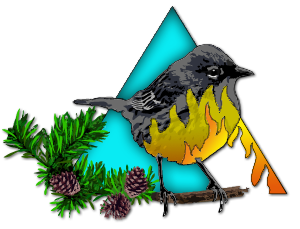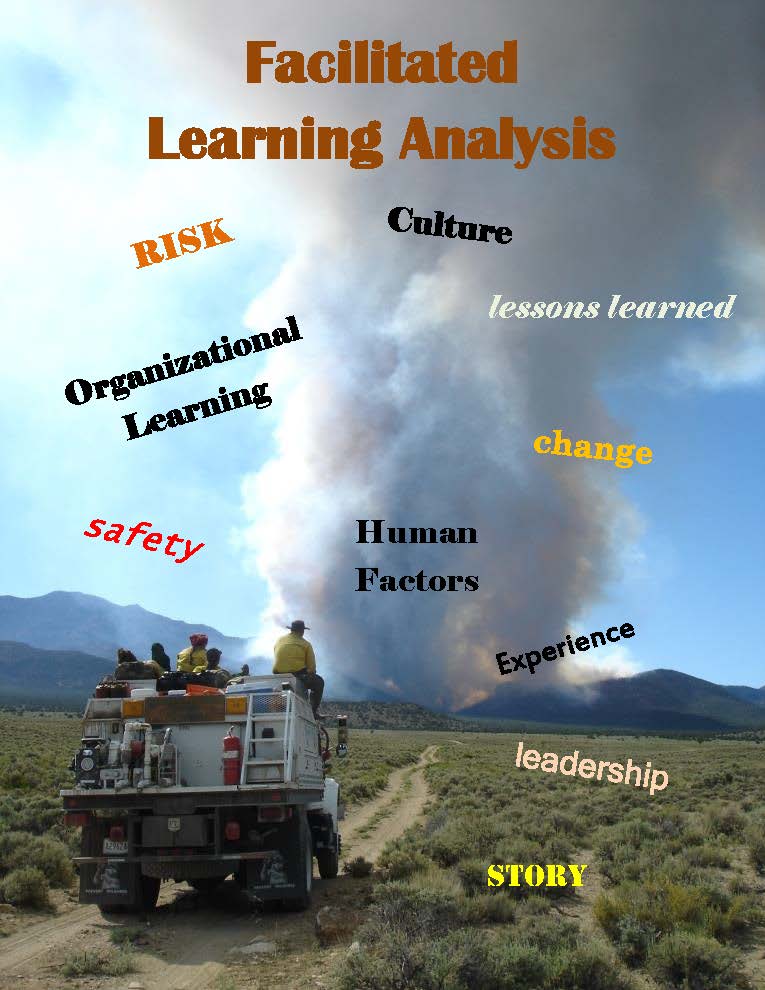Navigation

Upcoming Events
There are no events planned.
2015-2016 Webinar Series

A Brief Introduction to the Facilitated Learning Analysis
Thursday, January 21, 2016 at 2 PM Eastern (1 PM Central)
Persephone Whelan
Huron-Manistee National Forest
Huron Shores District
pdwhelan@fs.fed.us
“Any safety system depends crucially on the willing participation of the workforce, the people in direct contact with the hazards. To achieve this, it is necessary to engineer a reporting culture – an organizational climate in which people are prepared to report their errors… An effective reporting culture depends, in turn, on how the organization handles blame and punishment… What is needed is a just culture” -- James Reason
This webinar will be a brief glance into an organization’s grass roots adoption of the principles behind the Facilitated Learning Analysis (FLA), the learning curve, and a hopeful look into the future.
MP4 Video
Some recommended references and reading material for FLA:
Just Culture
Dekker, Sidney. Just Culture: Balancing Safety and Accountability. Aldershot, England: Ashgate, 2007.
Dekker, Sidney. Just Culture: Who gets to draw the line? Cogn Tech Work. 2007 Available at http://www.humanfactors.lth.se/fileadmin/lusa/Sidney_Dekker/articles/2008/JustCultureCTW.pdf
Marx, David. Patient Safety and the “Just Culture”: A Primer for Health Care Executives. New York: Trustees of Columbia University, 2001. Available at: http://www.unmc.edu/rural/patient-safety/tools/Marx%20Patient%20Safety%20and%20Just%20Culture.pdf
Sharpe, Virginia. Promoting patient safety: an ethical basis for policy deliberation. Hastings Center Report Special Suppl 33(5):S1–S20 2003. Available at: http://www.thehastingscenter.org/uploadedFiles/Publications/Special_Reports/patient_safety.pdf
Accident, Safety and Human Performance
Dekker, Sidney. The Field Guide to Understanding Human Error. 3rd Edition. Aldershot, England: Ashgate, 2014.
Hollnagel, Erik. The ETTO Principle Efficiency-Thoroughness Trade-Off: Why Things That Go Right Sometimes Go Wrong. Farnham, England: Ashgate, 2009.
Kahneman, Daniel. Thinking Fast and Slow. New York, NY: Farrar, Straus and Giroux, 2011
Neal J. Roese and Kathleen D. Vohs, “Hindsight Bias,” Perspectives on Psychological Science 7 no. 5 (September 2012), 411-426. Available at http://pps.sagepub.com/content/7/5/411.abstract
Reason, J. T. Managing the Risks of Organizational Accidents. Aldershot, England: Ashgate, 1997.
Reason, J. T. The Human Contribution: Unsafe Acts, Accidents and Heroic Recoveries. Farnham, England: Ashgate, 2008.
Tavris, Carol, and Elliot Aronson. Mistakes Were Made (but not by me): Why We Justify Foolish Beliefs, Bad Decisions, and Hurtful Acts. Orlando, FL: Harcourt, 2007.
Woods, D.D. and R.I. Cook. “Nine Steps to Move Forward from Error.” Cognition, Technology, & Work 4, no. 2 (2002): 137-144. Available at: http://www.ctlab.org/documents/NineSteps.pdf
Organizational Learning and Learning Culture
Jonathan Gottschall, The Storytelling Animal; How Stories Make Us Human, NY, New York, Mariner Books, 2012.
Isaacs, William. Dialogue and the Art of Thinking Together: A Pioneering Approach to Communicating in Business and in Life. New York: Currency/Doubleday, 1999.
Risk Management
Adams, John. Risk. 5th edition, London, England: Routledge, 2001
Taleb, Nassim. The Black Swan: the impact of the highly improbable. 2nd edition, New York, NY: Random House, 2010
Non-Fire FLAs for people
Retardant Avoidance FLA
Bear Meadows Stop Work FLA
Intermountain Regional FLA: Controversial Issues Management FLA
- To Test your computer internet connection and compatibility with adobe connect, click here and follow the prompts.
- You will need to use the speaker output from your computer, so make sure you know how to control your speaker volume and attach external speakers for better performance. We will prompt you to type questions in the chat box throughout the session.

.png)